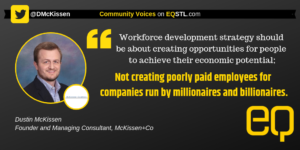
Why the St. Louis Region Should be Proud of the Startup Scene (and it Has Nothing to Do with Big Exits)
Writing by Dustin McKissen. Dustin McKissen is the founder of McKissen + Company, a public relations and strategy firm based in St. Charles, Missouri. He’s a two-time LinkedIn Top Voice on Management and Culture, and is a columnist for Inc., CNBC, VentureBeat and LinkedIn.
When I first became involved with the startup scene here in St. Louis, I heard one phrase get used a lot: St. Louis needed a big exit, preferably a billion-dollar exit, to validate its startup scene. A billion dollars would really put us on the map.
A billion dollars does sound pretty good.
If I personally had a billion dollars, I wouldn’t be freaking out over the payment on the base-model Toyota Tacoma I just bought. In fact, I wouldn’t have the base-model Tacoma. I would have bought the one at the front of the lot that had huge tires and a fold-out tent in the bed. And, just like the way Ice-Cube’s uncle paid for his new house in Next Friday, I would have paid cash money for that Toyota.
But I don’t have a billion dollars.
And St. Louis hasn’t had a billion-dollar exit—though Confluence Life Sciences was recently sold at a valuation of $100 million.
While the Confluence sale was great for St. Louis, huge exits shouldn’t be the way the region measures the success of our startup scene. In part, the success of the startup scene should be measured on its ability to eventually create economic opportunity that didn’t previously exist. Eventually one of those metrics of success should be a substantial number of good jobs.
However, the ability of founders and entrepreneurs to create good jobs is something that will be measured over time.
If someone had peeked into Steve Jobs’ parents’ garage in 1977, they wouldn’t have seen 116,000 people (roughly Apple’s current workforce) milling around. Instead, they would have seen several smelly hippies—at least one of whom would likely have been barefoot—making wooden “computers” no one thought they needed.
Point being, these things take a while.
In the meantime, the St. Louis region should be proud of the fact that we are trying to take control of our own destiny.
What do I mean?
Here in St. Louis, we tend to think of this region as unique. And in many ways, it is. St. Louis really does have the best baseball fans, and you can get something called provel “cheese” on your pizza.
So, you know, you take the good with the bad.
(Kidding—but seriously, that is a weird cheese.)
While we are special, the St. Louis economic story looks like a lot of other metropolitan areas, especially outside of a few select mega-cities. We aren’t the only region that’s struggling to find an economic identity in 2017. A recent study from the University of Virginia concluded that half of all net new job creation comes from just five cities: Dallas, Houston, Los Angeles, Miami, and New York.
That’s a short list, and it’s a list that means a lot of other metropolitan areas are struggling to create economic opportunity in their communities. However, there is also a short list of metropolitan areas that have been aggressive about supporting entrepreneurs, startups, and small businesses—and St. Louis is at the top of that list. As a writer for several national publications, I can tell you I never see as much written about another metropolitan area supporting startups at the scope and scale that the St. Louis area does.
Arch Grants, ITEN, BioSTL, BioGenerator, Capital Innovators, OPO Startups, EDC Business & Community Partners, the Ameren Accelerator, Brazen-St. Louis, SixThirty, Startup Connection, Lewis & Clark Ventures and more are all part of a constantly expanding entrepreneurial ecosystem. Other communities aren’t as lucky as we are. Last week I traveled to Albuquerque for Global Entrepreneurship Week. Though the city is smaller than St. Louis, it has the highest per capita rate of science PhDs in America—and is envious of our startup scene.
We should be proud of what we’ve built—and not because of the cash support given to startups, or the potential for talented entrepreneurs to one day take that support and turn it into a successful exit. We should be proud because it shows a community-wide belief that you can change a metropolitan area from within. It shows that you can build a new civic identity and economic reality from the ground up.
It might sound cheesy, but you can’t put a price tag on teaching yourself to believe you control your own destiny.
That’s true for individuals, it’s true for startups, and it’s true for communities and societies.
And it’s why this region already has a lot to be proud of.






